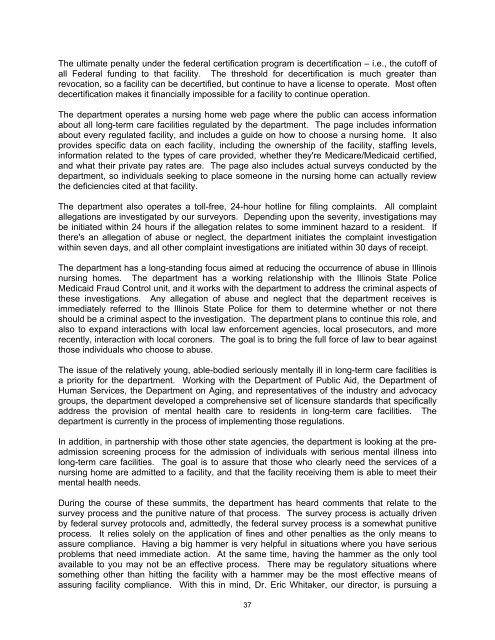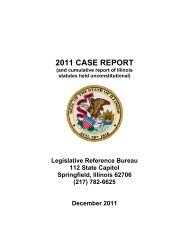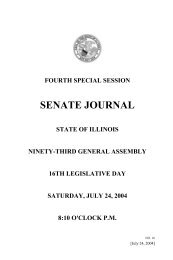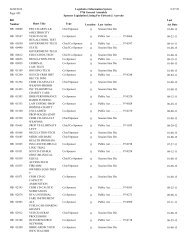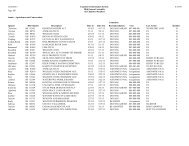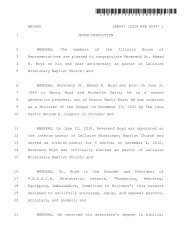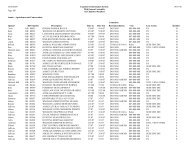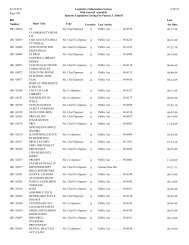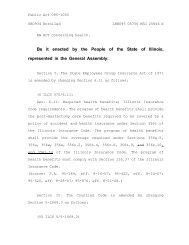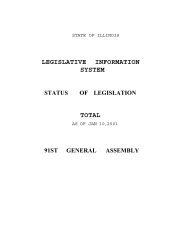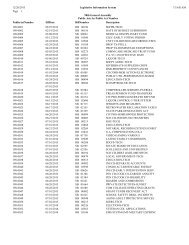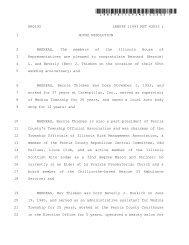Long-Term Care - Illinois General Assembly
Long-Term Care - Illinois General Assembly
Long-Term Care - Illinois General Assembly
You also want an ePaper? Increase the reach of your titles
YUMPU automatically turns print PDFs into web optimized ePapers that Google loves.
The ultimate penalty under the federal certification program is decertification – i.e., the cutoff of<br />
all Federal funding to that facility. The threshold for decertification is much greater than<br />
revocation, so a facility can be decertified, but continue to have a license to operate. Most often<br />
decertification makes it financially impossible for a facility to continue operation.<br />
The department operates a nursing home web page where the public can access information<br />
about all long-term care facilities regulated by the department. The page includes information<br />
about every regulated facility, and includes a guide on how to choose a nursing home. It also<br />
provides specific data on each facility, including the ownership of the facility, staffing levels,<br />
information related to the types of care provided, whether they're Medicare/Medicaid certified,<br />
and what their private pay rates are. The page also includes actual surveys conducted by the<br />
department, so individuals seeking to place someone in the nursing home can actually review<br />
the deficiencies cited at that facility.<br />
The department also operates a toll-free, 24-hour hotline for filing complaints. All complaint<br />
allegations are investigated by our surveyors. Depending upon the severity, investigations may<br />
be initiated within 24 hours if the allegation relates to some imminent hazard to a resident. If<br />
there's an allegation of abuse or neglect, the department initiates the complaint investigation<br />
within seven days, and all other complaint investigations are initiated within 30 days of receipt.<br />
The department has a long-standing focus aimed at reducing the occurrence of abuse in <strong>Illinois</strong><br />
nursing homes. The department has a working relationship with the <strong>Illinois</strong> State Police<br />
Medicaid Fraud Control unit, and it works with the department to address the criminal aspects of<br />
these investigations. Any allegation of abuse and neglect that the department receives is<br />
immediately referred to the <strong>Illinois</strong> State Police for them to determine whether or not there<br />
should be a criminal aspect to the investigation. The department plans to continue this role, and<br />
also to expand interactions with local law enforcement agencies, local prosecutors, and more<br />
recently, interaction with local coroners. The goal is to bring the full force of law to bear against<br />
those individuals who choose to abuse.<br />
The issue of the relatively young, able-bodied seriously mentally ill in long-term care facilities is<br />
a priority for the department. Working with the Department of Public Aid, the Department of<br />
Human Services, the Department on Aging, and representatives of the industry and advocacy<br />
groups, the department developed a comprehensive set of licensure standards that specifically<br />
address the provision of mental health care to residents in long-term care facilities. The<br />
department is currently in the process of implementing those regulations.<br />
In addition, in partnership with those other state agencies, the department is looking at the preadmission<br />
screening process for the admission of individuals with serious mental illness into<br />
long-term care facilities. The goal is to assure that those who clearly need the services of a<br />
nursing home are admitted to a facility, and that the facility receiving them is able to meet their<br />
mental health needs.<br />
During the course of these summits, the department has heard comments that relate to the<br />
survey process and the punitive nature of that process. The survey process is actually driven<br />
by federal survey protocols and, admittedly, the federal survey process is a somewhat punitive<br />
process. It relies solely on the application of fines and other penalties as the only means to<br />
assure compliance. Having a big hammer is very helpful in situations where you have serious<br />
problems that need immediate action. At the same time, having the hammer as the only tool<br />
available to you may not be an effective process. There may be regulatory situations where<br />
something other than hitting the facility with a hammer may be the most effective means of<br />
assuring facility compliance. With this in mind, Dr. Eric Whitaker, our director, is pursuing a<br />
37


